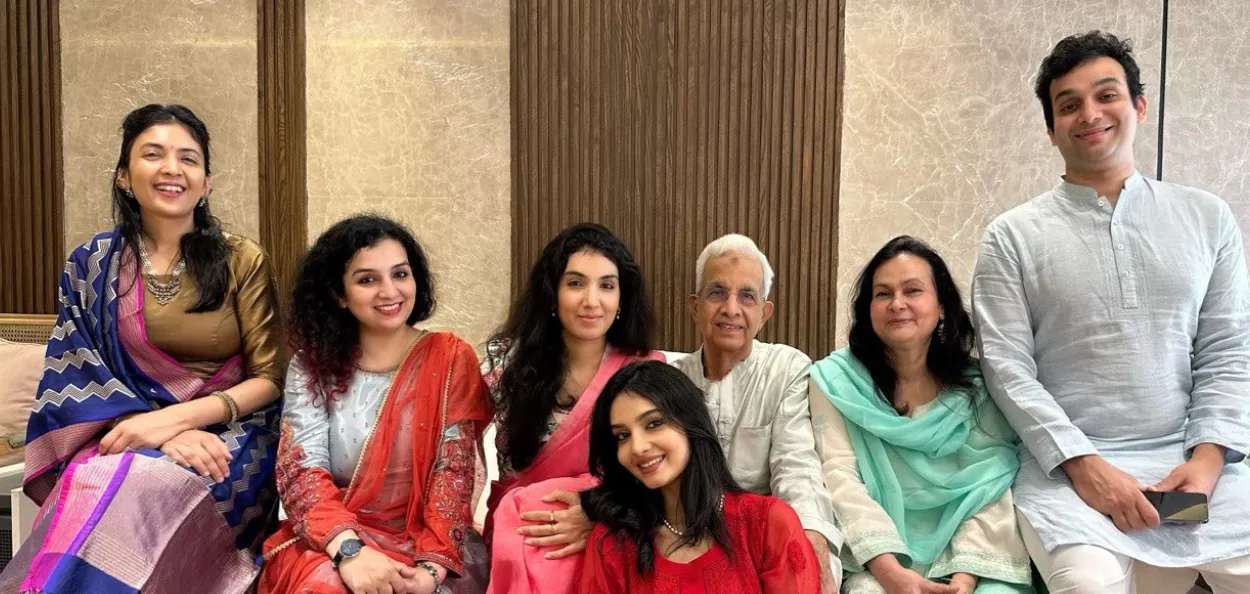
Shaista Fatima/New Delhi
It was a day in November of 2020. Commercial flights were taking off after a long hiatus due to the COVID-19 pandemic. Sumitra Devi (name changed on request) was flying for the first time in her life of 80-plus years from Gaya to Delhi. Out of sheer curiosity, she asked the crew to show her the pilot of the airplane. The air hostess of A 320 escorted her to the cockpit.
As soon as she peeped inside, Sumitra Devi's pupils widened and she quipped in a Haryanvi accent: “Oi yahan to chori baithi” (Oh! It’s a girl sitting inside).
Thinking of that day makes Hana Mohsin Khan laugh loudly even today. Hana’s post on Twitter about this went viral and she became 'famous.' Hana is one of the 34 Muslims among 3,500 women pilots in India. As such India has the largest proportion of women pilots in comparison with the rest of the world and yet the representation of Muslims is also one in 100.
Hana’s rise wasn’t easy; she reached this position after pursuing journalism and running an event management company. Growing up as a Muslim woman brings its own set of challenges for girls with evolved minds and higher ambitions. Hana too had to face this.
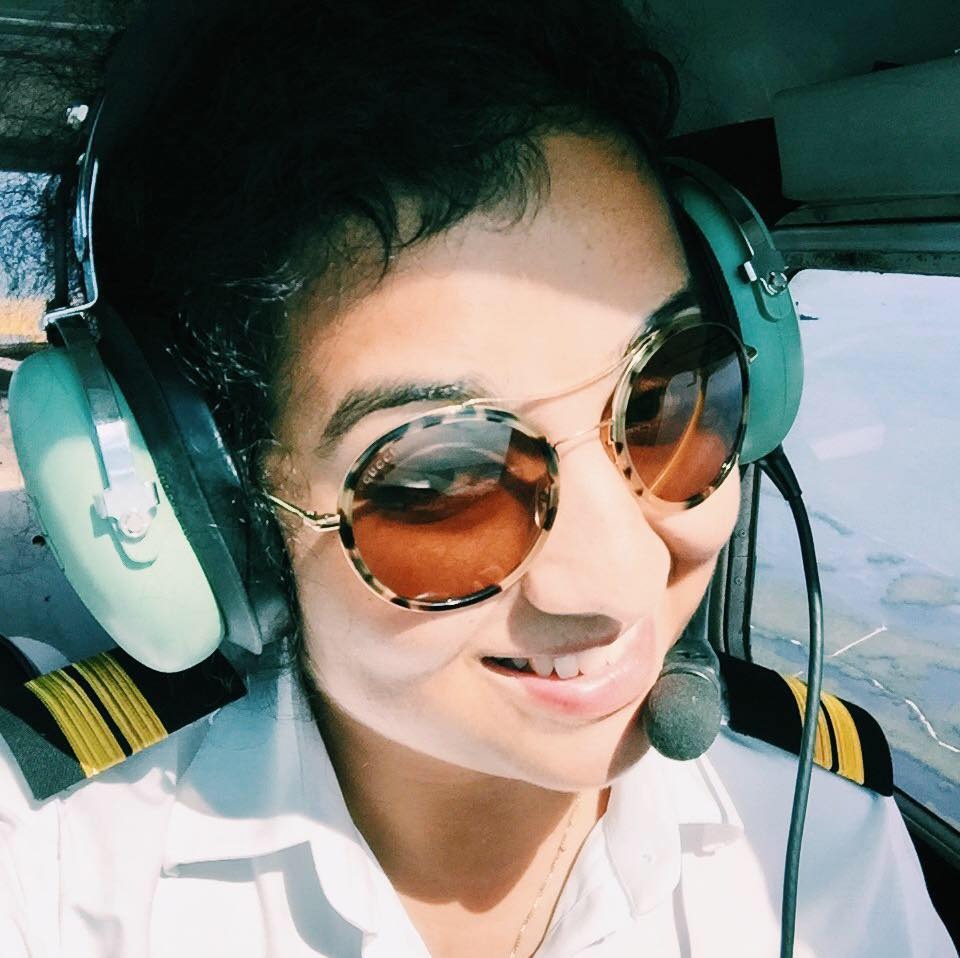
Hana Mohsin Khan in the cockpit
She did her schooling in Saudi Arabia and after passing her 10th standard, she returned to Meerut City, Uttar Pradesh. While in Saudi, she lived in a society where women were not treated on par with men, back home, in her Muslim milieu, she was labeled as a “fast girl”. After she shifted to Delhi for her graduation, she was labeled as a “prim and proper’ woman, a euphemism for a docile woman in an urban environment.
Hana says these labels impacted her and became a reason that made her take long to find her true calling. Today, after being a celebrity, she says she is "still eager to gain knowledge." She says, "Don't be surprised if some 10 years down the line you see me having mastered in some other field."
Speaking with Awaz-the Voice she recalls meeting a group of pilots attending a wedding in 2014 in Trivandrum. They invited her over for a cup of tea, “Facebook used to have a check-in where people would flaunt their status while flying. I realized I was the only non-flying person in that group.” Suddenly Hana realized her calling; she decided to become a pilot.
Hana said, “I started preparing for the qualifying examinations in the off-wedding season, I used to study 18 hours a day; it wasn’t easy as I should have appeared in the examination at least 15 years back.” Hana cleared her written test with flying colours. She cleared three flying tests to receive her commercial flying license. Later, she went to Florida, USA, for her flight training and to Greece to specialize in flying an Airbus.
However. Hana's real battle lay ahead, as she hadn’t yet broken the news to her parents. “It was like a movie scene, I sat my parents down and told them, “I am about to break an important decision to you, but you cannot say anything negative, at least not in front of me.”
Hana was speaking and she would see her parents were looking nervous. However, they never said no to her. Soon she got a job with a major airline and it was the time when her mother exclaimed, “Everyone said she was making a mistake, there aren’t jobs available in this field, and so on…”
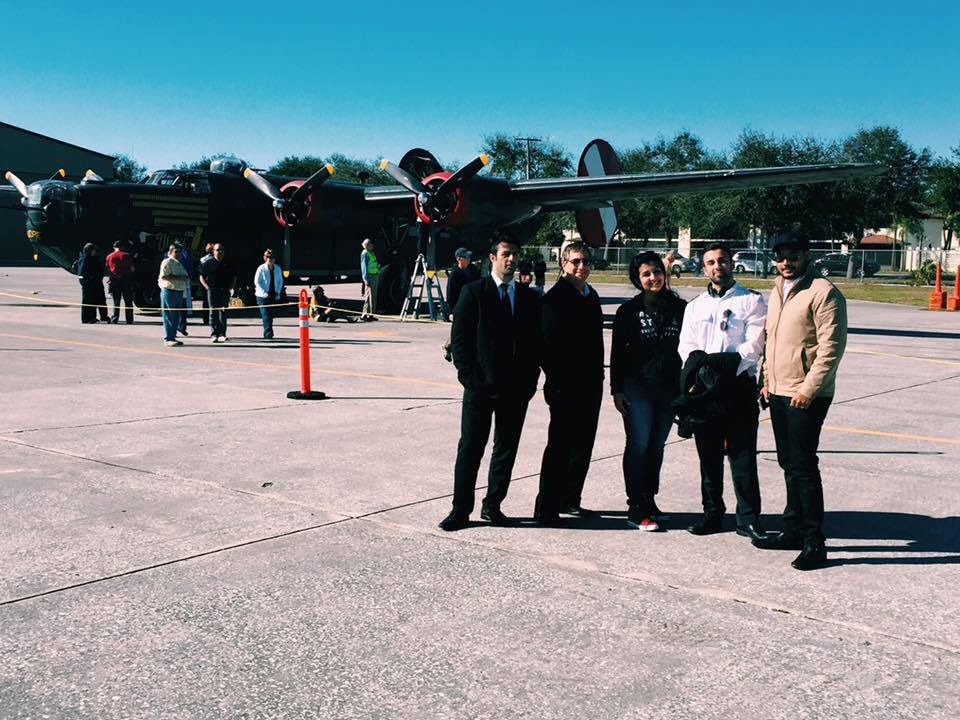
Hana Mohsin Khan during her training days
Her father Mohsin Khan comes from Shahjahanpur, Meerut while her mother hails from Pabli. The couple had big dreams for their children. Her family shifted to Saudi Arabia when Hana was a toddler. “Growing up, I never felt lesser than anyone, it is now that I realize that maybe we women are not as strong as men but that doesn’t make us less equals and I thank my father for it.”
Hana, the eldest of her four siblings, was a born leader and was blessed with supportive parents. However, in the school, she struggled for equality. “Growing up in Saudi Arabia I never saw women driving, I didn’t see women doing a lot of things that I thought they should be doing, though now it's changed, I think that is why I became a rebel more than anything else.”
"In my school in Saudi, the smaller building was for the girls while the bigger one was allotted to boys, though we went to the boys' building for attending functions; the very idea of bifurcation based on gender disparaged me.”
She shared an incident from her 10th standard. “At a summer camp where teachers of the girls' and boys’ school were swapped; a male teacher started teaching the chapter on engines to a class of girls. The teacher wrote the name of the chapter on the board and said: “Arey yeh engine hain (oh! Its engines), I know most of the girls won’t be interested”, and started laughing.”
It offended the 13-year-old Hana. She asked her father to teach her everything about engines. “I went through encyclopedia videos and made my father open our car bonnet and tell me about the engines. It was in the 55-degree Celsius temperature but hats off to my father who didn’t stop me from asking the questions and taught me all about the engines.”
The next day she surprised her teacher with her knowledge of engines.
When Hana returned to Meerut City to pursue her studies after 10th, she was ostracized for being too vocal in demanding rights. “I was questioned about what I wore, riding a Scooty, and being friends with the boys.”
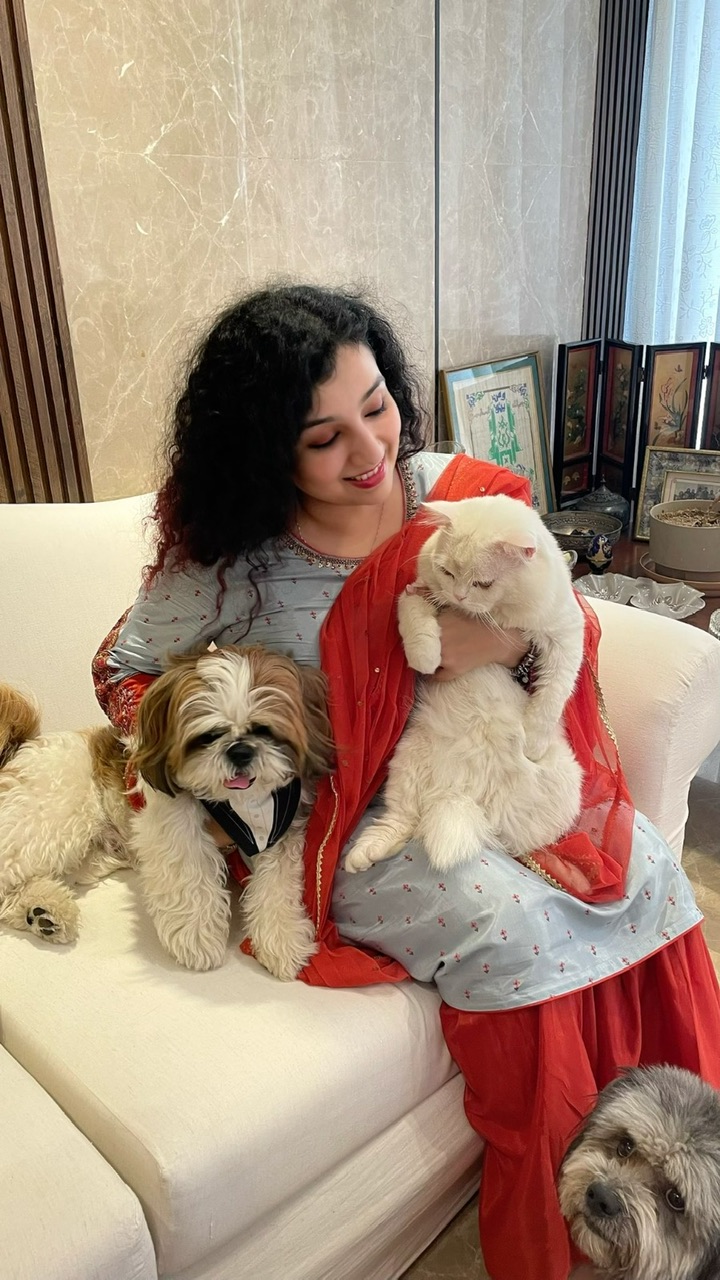
Hana Mohsin Khan with her pets Chewy and Cessna
She had scored 99 percent marks in science and 100 in math in her 10th standard back in Saudi. In Meerut, she decided to pursue the science stream. People asked her, “tum toh musalman ladki ho (you are a Muslim girl), why are you making it tougher for yourself?'
Such remarks made her feel uneasy, “I no longer had an interest in science”, she adds. Soon Hana shifted to Delhi to pursue a bachelor's in mass communications, “Here I was labeled a small-town girl who didn’t go out after 9, followed the rules, and so on.”
She wasn't distracted; all this fueled her ambition even more. She was interning from the very first semester of her graduation. “I attended college and worked in the evening. My first job was with Vinod Dua (the late journalist). He was my first boss, and I got Rs 5,000 as my first salary. I was 17 years old.”
She says, “My father grew up in a village and was one of the first few people to study and leave the city and marry outside the family. He wanted the best for his children, so he worked very hard on us.”
She says, “My mother and I dream alike, she has these innovative ideas and wants the best in everything". She remembers the moment when she finished her flying and joined a job when someone in her family fell sick, she told her mother in a lighter vein, "Amma we need a Doctor in the family”. Amma quipped, "Why don’t you become one”. Hana says, her mother was serious, "She somehow feels that I can be a doctor; when you have such driving forces backing you up, it is hard to fail.”
Today while talking to Awaz-the Voice Hana says, “You know though I have no regrets about my decisions but somewhere it took me a long time to find my true calling."
Hana made a special mention of her maternal grandmother who was a school principal and was responsible for educating an entire generation, "My Nani came to the city and made sure that all her kids got a good education, I've always looked up to her for inspiration."
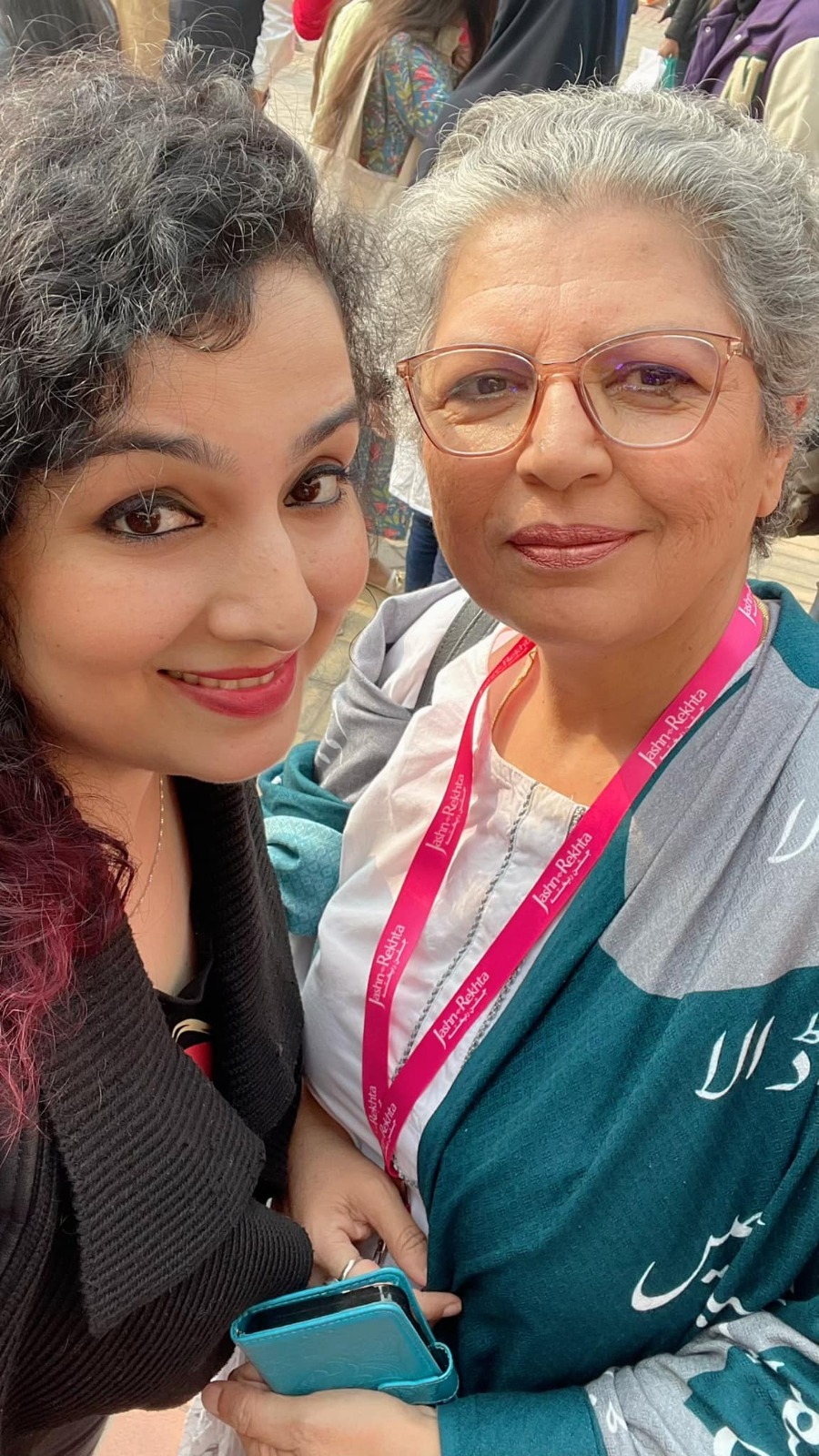
Hana Mohsin Khan with author Rana Safvi
“I could have been a NASA scientist or an engineer, you never know but I would end up hearing extraordinary stories about myself that weren’t true and it made me question myself, and unfortunately it was a new experience for my parents as well thus they couldn’t help me out either, sadly my community people didn’t want me to grow.”
In 2020, Hana flew her first commercial flight. “I was praying for a good landing and it was a good landing, I felt so thankful to the universe and to the world for giving me this opportunity, I thought that even if I were to die today, I'd have no regrets."
Hana went down memory lane. “So many years have passed yet it feels fresh in my memory, the only difference being, today I can laugh out loud and feel happy, sad, angry at the same time.”
Hana says if she could then she would go back to her younger self and tell her and women like her to never doubt their worth and fight for their rights even if that means turning their backs on society, “Being happy with what you are doing, being satisfied is more important than anything.”
She feels women should help out one another, “We need all the help we can get, all the women need, all the help after so much we all have gone through, all women in India at least. We hear things about ourselves which are untrue, we get cat-called, harassed on the road yet we fight, we learn how to fight.”
According to her, retaliation is a many-step process that starts with being scared which slowly leads to anger and later on becomes action, “Imagine the strength that we have, imagine not being crazy, staying fine, working, behaving like normal human beings, being emphatic, taking care of our families and communities…”
Hana says, “I mustn't be judged for wearing a short skirt or for covering myself from head to toe, either of these choices cannot be forced on me.” She says, “My not wearing a hijab doesn't make me less of a Muslim. We already have it hard as women. And then we are further categorized as Muslim women, and then we have external factors that make it harder to be Muslim. So, it's so much, so many intersectionalities.”
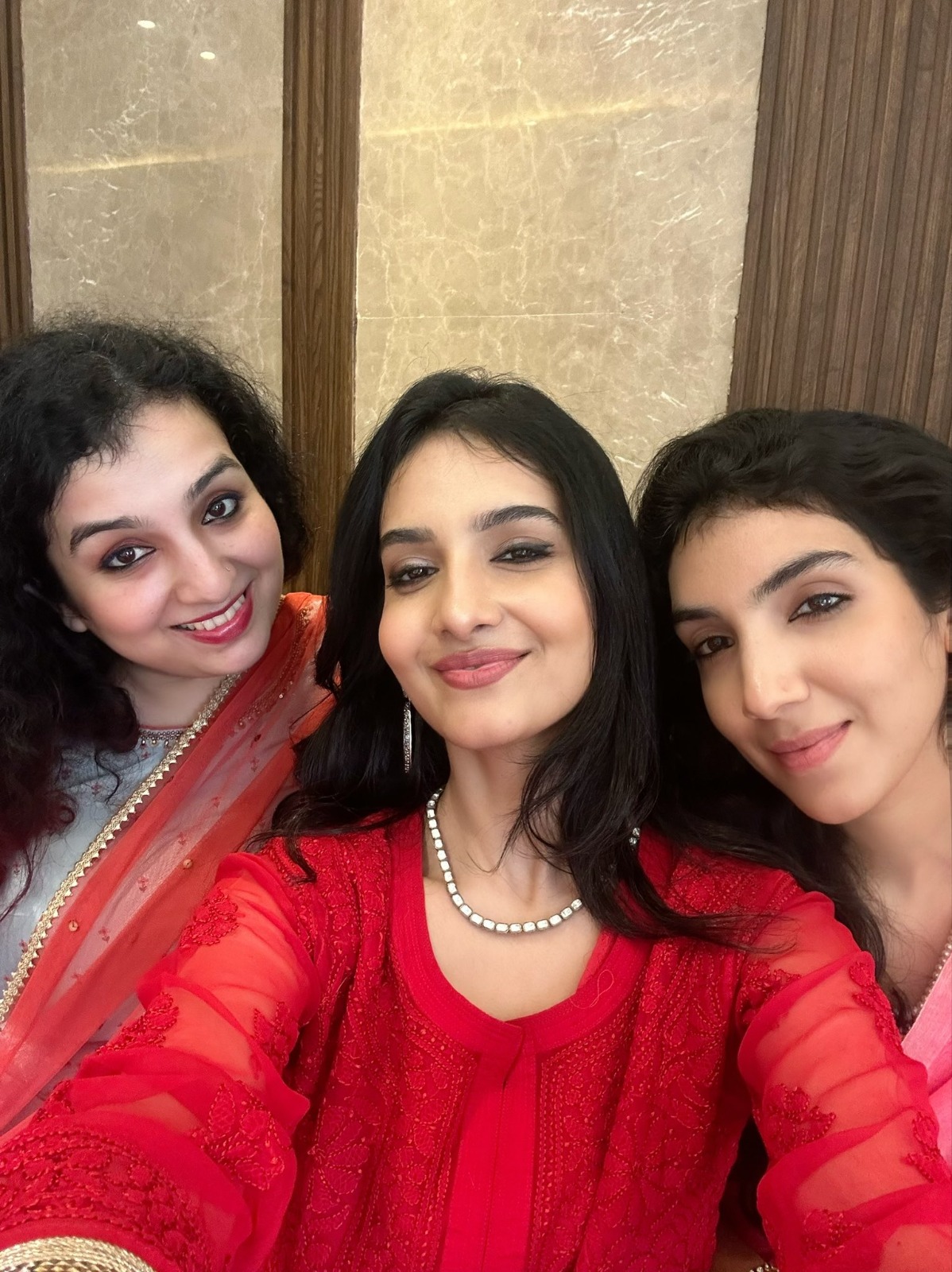
Hana Mohsin Khan with her sisters
Hana narrates an interesting incident of how gender discrimination is rampant, Hana was once performing her ablutions in Jama Masjid when a man came up to her and said that she was doing it the wrong way as the water didn’t touch the tip of her elbow. She retorted “Your ablution is null and void as you were busy watching me while doing it”.
She feels airports and airplanes make beautiful humane stories. “The other day I saw this man who was video calling his wife and showing him the insides of the aircraft, I was walking beside him and saw how happy they were.”
One day a CISF lady officer complimented Hana, “Madam uniform suits you.” Hana replied, “Yours looks perfect on you too, uniform suits all women.' Hana's favourite moment: once a 5-year-old girl saw Hana in uniform and she turned to her mother, "Can girls also be pilots?" "Her mother looked at me and said, of course, they can. Hana patted the girl and said, “Sweetheart if I can, you can too”.
On the trend of social media, Hana says, “It was during the Delhi riots that I realized Twitter was a serious space, along with Rana Aapa (Writer Rana Safvi), Tarique, Yuman Aapa, Safa and others we were able to raise funds and rehabilitate 44 families of Mustafabad, we gave them ration and money to pay rent for three months.”
Hana uses her social media to help aspiring aviators. In one of her Instagram stories, she answered some 1,000 questions about flying and an aviation career.
ALSO READ: Army officers Saria Abbasi, Fatima Wasim show women power in Army
Besides flying Hana is a voracious reader, a food enthusiast, a pet mom, and a part-time writer. She says, “Age is just a number, if you want to do something then trust me just go with it and things will fall into place.”
